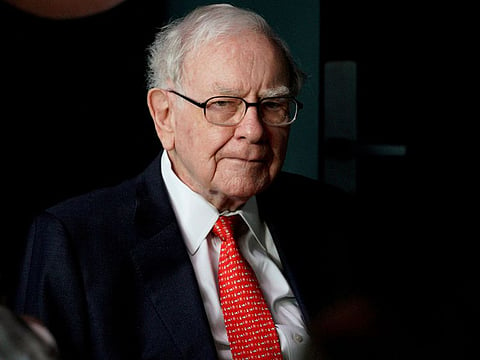Warren Buffett’s Berkshire Hathaway posts massive $43.8b loss
Berkshire ended June with $105.4 billion of cash and equivalents

New York: The slide in US stock prices punished Berkshire Hathaway Inc’s bottom line in the second quarter as the company run by billionaire Warren Buffett posted a $43.8 billion loss.
Berkshire nevertheless posted better operating results, as improved results from reinsurance and the BNSF railroad offset a loss from the Geico car insurer, where car parts shortages and higher vehicle prices boosted losses on accident claims.
Rising interest rates helped Berkshire’s insurance units generate more money from investments, while the strengthening US dollar boosted profit from the company’s European and Japanese debt investments.
Investors closely watch Berkshire because of Buffett’s reputation, and because results from its dozens of operating units in the insurance, railroad manufacturing, energy and retail sectors often mirror broader economic trends.
Berkshire’s net loss was equal to $29,754 per Class A share, and compared with a net profit of $28.1 billion, or $18,488 per Class A share, a year earlier.
Quarterly operating profit rose 39 per cent to $9.28 billion, or about $6,326 per Class A share, from $6.69 billion, or $4,424 per Class A share, a year earlier.
Berkshire slowed repurchases of its own stock, buying back $1 billion in the quarter and $4.2 billion so far this year.
It also bought more than $6.1 billion of stocks, down from $51.1 billion in the first quarter, when it took major stakes in oil companies Chevron and Occidental Petroleum.
Berkshire ended June with $105.4 billion of cash and equivalents. It expects to complete its $11.6 billion takeover of insurance company Alleghany in the fourth quarter.
Net results swing wildly because the Omaha, Nebraska-based conglomerate must report investment gains and losses on its stock holdings even if it buys and sells nothing.
That proved a drag in the second quarter, as Berkshire recorded $53 billion of losses from investments and derivatives.
The stocks of three major holdings - Apple, Bank of America and American Express - each fell more than 21 per cent.
Buffett urges investors to ignore the fluctuations, and Berkshire will make money if stocks rise over time.
In 2020, for example, Berkshire lost nearly $50 billion in the first quarter as the COVID-19 pandemic took hold, but made $42.5 billion for the full year.
Berkshire owns dozens of businesses that also include its namesake energy operations, several manufacturing companies, and consumer companies such as Duracell batteries, Fruit of the Loom underwear and See’s Candies.
The company’s shares have outperformed the broader U.S.
market in 2022, falling 2 per cent compared with a 13 per cent drop in the Standard & Poor’s 500.






